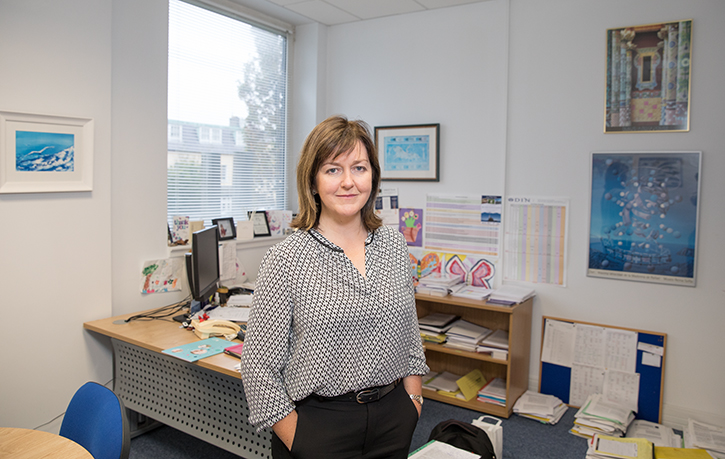- Home
- About the EDI Unit
- News & Events
- Publications
- EDI Training Hub
- Equality Committee
- Gender Identity and Expression
- Sexual Violence and Harassment Framework
- Speak Out
- University of Sanctuary
- Athena SWAN
Professor Mairead Kiely, School of Food & Nutritional Sciences
Mairead Kiely, Professor of Human Nutrition

College: Science, Engineering & Food Science
School: Food & Nutritional Sciences
Research Interests: Vitamins, especially vitamin D, and Maternal and Child Nutrition
IRIS profile: http://publish.ucc.ie/researchprofiles/D018/mkiely
What first attracted you to your academic discipline?
I started out with a degree in Human Nutrition because I thought it might be interesting. Nutrition combines life sciences, behavioural sciences, maths and food, and it's a perfect choice for an all-rounder. Nutrition informs and learns from many disciplines and because it's a new science, it's dynamic, exciting and of course, controversial. As Nutrition is a huge component of the gap between genetic potential and attainment as well as healthy aging, it's relevant to everyone.
How were you drawn to your current research interests?
My main interests are in vitamins, especially vitamin D, and in Maternal and Child Nutrition. Both these areas are under-researched and there are many unknowns. Micronutrient deficiencies are widespread, and young women, mothers, and children are among the most vulnerable. It's a challenging area but there is real potential to make a contribution.
What professional achievements do you consider particularly rewarding?
I still get a kick out of each achievement - every paper, thesis, grant, but the best part of this job is the opportunity to discover something new, to fit a little piece of the puzzle. There are a couple of standouts. I was proud to jointly co-ordinate the largest global consortium on Vitamin D, the ODIN project, from 2013-2017, which was funded by the EC and included 19 countries. Our work in UCC has informed almost every competent authority around the world in setting dietary recommendations for vitamin D intakes. That's a lot of people who are hopefully at lower risk of vitamin D deficiency partly because of our work. We've also had breakthroughs in maternal and infant nutrition that are influencing policy and clinical practice, which is improving health outcomes in vulnerable groups.
Have you had professional role models? What impact did they have on you?
I've been lucky to work with and learn from some fantastic scientists. There are so many examples of excellence in science, impact, resilience, leadership across all walks of life, so I take inspiration from lots of people.
What aspects of your work do you find most rewarding?
It's a privilege to learn something new every day and I don't take that for granted. Working with students and young investigators is hugely rewarding, particularly when they realise their dreams and ambitions (and still want to collaborate years after they've moved on). Working with international scientists is a huge bonus and I've had the opportunity to collaborate with many genuine leaders in their fields. For me, writing is the toughest and most solitary part of the work but massively rewarding.
Academic careers present specific challenges in achieving balance, whether between research, teaching and administration, or in work/life balance. What advice might you give a student/younger colleague/your 18-year old self?
An inspirational lecturer from my undergrad degree said that anything was achievable, if you acknowledge a simple truth - take what you want and pay for it. So you need to own your choices. Continually evaluate your overall goals and try to map your activities onto those. Thinking about career satisfaction and development specifically, identify what you want to achieve and do the work required to achieve it. Bear in mind your organisation's requirements, as you have no control over those. In Nutrition, energy balance is a dynamic process. I think that overall balance is like this - circumstances, schedules and energy levels change over time and it's important to continually adapt.
